Items
Subject is exactly
Education--K12
-
 2024-05-10
2024-05-10Two weeks turns into months
Hearing of this so-called COVID-19 virus towards the beginning of my junior year of High School sounded a little suspicious. It was as if I was watching a movie about an apocalypse. Where everyone rushes to the supermarkets and grabs everything they can. Disinfecting every item as we bring it back into our house. Making sure we wear masks. The news of hearing that two weeks off of school to any student sounds amazing. Although I didn't expect it to turn into months. Not being able to see any of my friends or teachers. Learning everything online has changed the way schools teach to this day. It went from "Yes two weeks off" to "Where did time go?". As time passed going back into school was an adjustment as well. Only kids with the same starting last names had to go to school one day while the other half had to another day. Still, wearing masks doing COVID check-ups before entering the school as well as even checking our temperature as we walk in. Overall looking back I've noticed how hard Covid hit globally. People had to isolate for long periods of time, making sure family members and friends were okay. It was overall a tough time, but we can take a lot from this pandemic to use in future uses. -
2020-04-01
Navigating the Pandemic
Covid-19 was life changing not just for me but for the rest of the world. Finding out that school was going to closed for a day, to two weeks, to months and then suddenly spending my senior year of highschool through zoom. At first, like every student I was excited that school was going to be off for a few days but who would have known what we were in store for. During this time, I was taking all classes through zoom, just like every other student, and the only thing that mentally got me through this pandemic was my PGC family. PGC is known as Peer Group Connection in my high school, Thomas A. Edison CTE. This class was operated by the seniors who had this own group with another partner to talk to freshman, sophomore, and juniors. This class was mainly about encouraging and helping one another as well as doing activities. Although, the pandemic had a significant impact on this class, we were only meeting through zoom but overall we were all eachother's support system. We talked about any and everything with our kids, the good and the bad. This helped us tremendously with our emotions, as well as still having fun through such a difficult time period. -
2020-06-12
A missed out senior year.
When it came to finally reaching my prime year, senior year in high school, I was nothing but excited for finally having that prom experience, the one I've seen in movies for years and the thing that I hyped up in my mind with my now EX ex-girlfriend. Except thanks to covid happening, all of that was shut down, completely shut off from happening. So instead of having prom, I had nothing. Which, to many people would have been seen as stupid but in high school I would've done anything to have something like that. An experience to dress up for a good cause and see people in dresses. Except since it didn't happen thanks to covid, I have a sort of missing feeling when it comes to high school. Everyone talks about prom and how amazing it was, and now I cant relate to it at all since I never experienced it. Probably the main reason why i ahte talking to people . -
2024-04-09
My Horrible experience
Whenever COVID first started I didn't think about I thought it was nothing I remember when we got two weeks off of school I was excited about it then they told us we wouldn't be going back and we had to do work online with no teacher help it was a horrible experience I passed but my grades weren't that great and I got really lazy and started to gain a lot of weight didn't go outside for a while and I couldn't play football than when 9th grade started it was a weird experience going online and then going to school for two or three days out the week and have to stay 6 feet from everyone it was a hard experience I played football but it was 4 or 5 games, not a full season and we had to wear a mask it was bad. COVID took a lot from me during my freshman year of high school and other things that were important to me. -
2020-08-18
life in camera
When COVID-19 first started I was in 8th grade. I didn't really understand what Covid really was or how serious it was. I went in feeling kind of okay about it all and staying at home. Once high school started things went downhill for me mentally. I did pretty well in school. I did all my work and turned it in on time and got good grades, but I struggled a lot mentally with myself and socializing with others. During that time being at home did help me to get closer to my mom, we would go walking throughout the day and that helped me a lot to start losing weight a lot more. However, I started to become depressed and struggled with my outward appearance a lot. Once we started going back to school in person, I didnt know ow how to act, I just felt ugly and quiet. I used to be such an outgoing person and I would talk to almost everyone. Now I don't like being in public and around others. I have very bad social anxiety and overthink a lot about what people think of me. I personally never got Covid-19 so I don't know how that can affect someone physically and I hope I never do. I watched those around me get it and the way that they struggled and even saw a few of them die. It was a really depressing time, to watch your loved ones around you hurt and struggle and eventually give up, and you're never able to see them again. Going back to school in person did help me a lot. Socializing with people and seeing my friends that I hadn't seen in so long was what really helped me to get out of my shell and help me love myself more. -
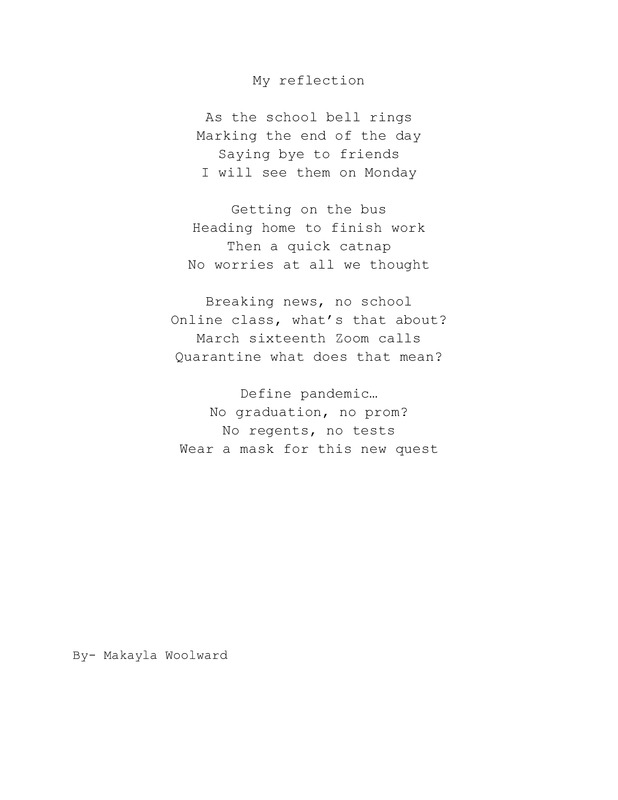 2021-03-16
2021-03-16March 16th.
Being in high school going about my normal day and later finding out that we will not be attending school until further notice. -
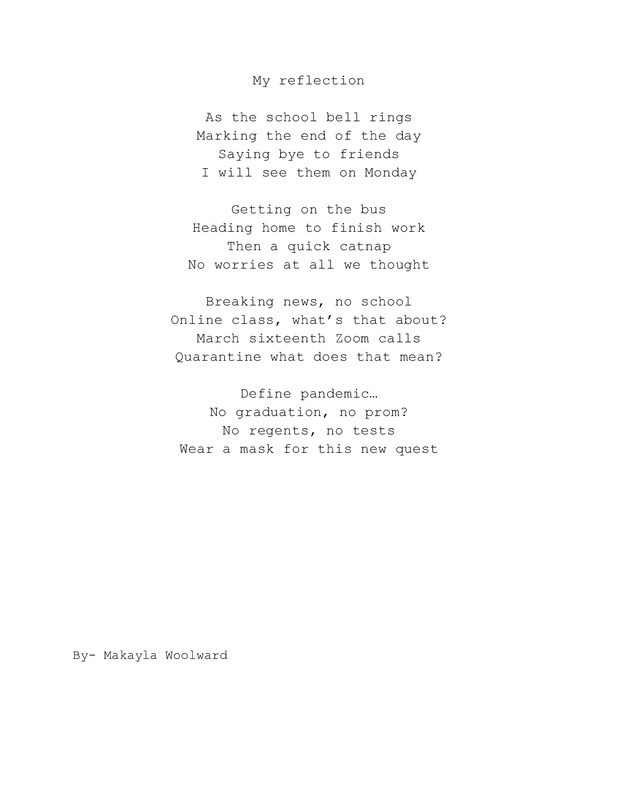 2020-03-16
2020-03-16Makayla Woodward's Reflection
A haiku poem of my experience on the school day before quarantine started and when it was announced. This poem is important to me because it shows a high school student's perspective on the pandemic. Many did not know the meaning of the events occurring not knowing how it would impact the rest of our lives. -
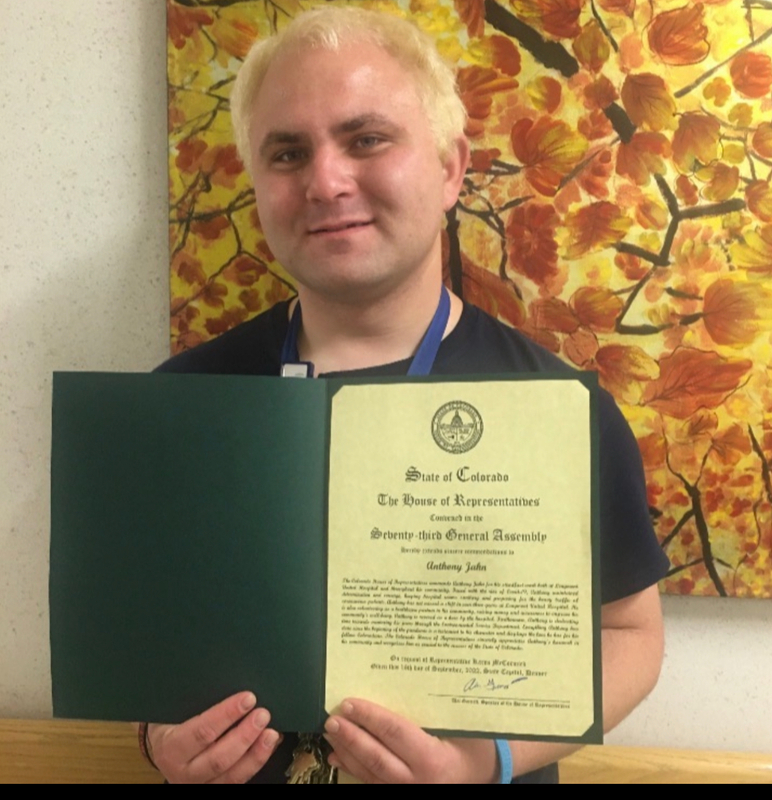 2022-09-22
2022-09-22Anthony
Explains about the warzone in the emergency department doing good during those times to bring people together in the community and a hero being honored by the state of colorado for all his work .This was submit to the house of representatives and this story has been shared in schools such as fredrick highschool by students who look up to him thank you -
2020-03-11
The Effect COVID-19 Had on me.
I was a freshman in high school when we had the first COVID outbreak. I remember when my mom had to explain to me what was going on. It happened so fast I was just a confused and scared kid. Then I found out we had to go online. I missed a big part of my freshman and sophomore year of high school because of COVID. I lost contact with a lot of my friends. It was a very rough time not just for me, but also my parents. It was a very big change. I want to say the time sucked, but I try to think of the positives that came out of it. By one being I got a lot closer with my family. We were always close, but through COVID we only had each other. So, I try to think of the positives that happened throughout the pandemic rather get sad and think of all the things I have missed out on. -
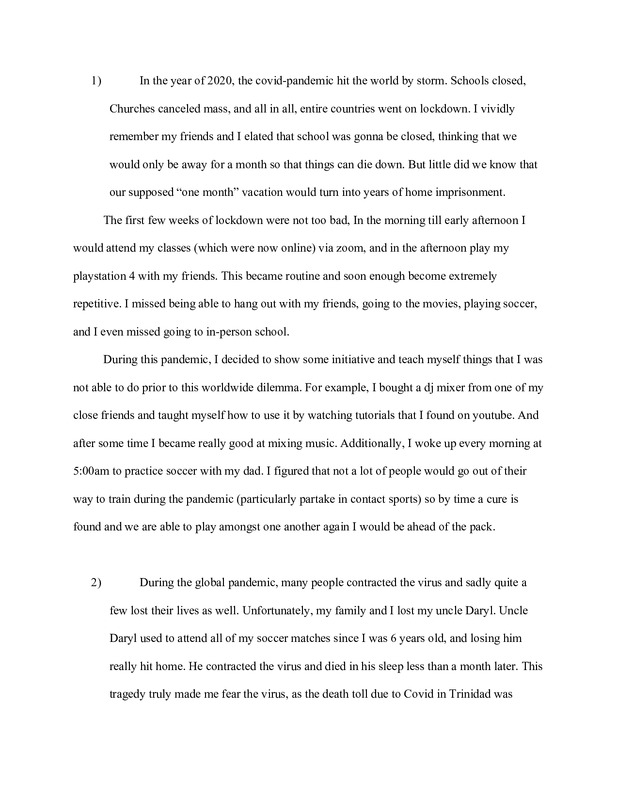 2020
2020Life of a Trini during the Covid 19 Pandemic
My story talks about difficulty I experienced during the pandemic -
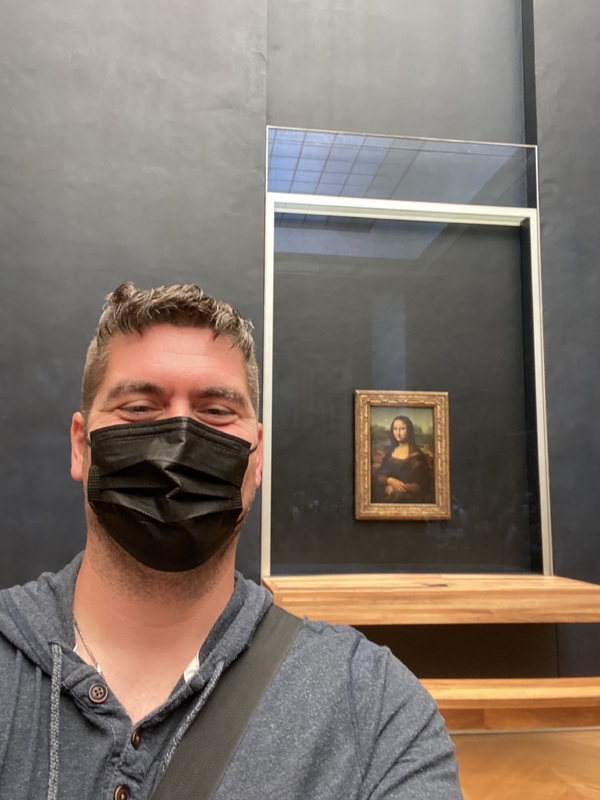 2022-06-03
2022-06-03First Student Trip After COVID-19 Pandemic Began
I have led a student global travel trip for the last 10 years at my school. Because of the COVID-19 outbreak in 2020, our trip to Australia and New Zealand was delayed/cancelled until 2021 in hopes of COVID being over by then. I had 27 students have to postpone traveling on this trip. In 2021, we came across the same restrictions, and our trip was cancelled again. As we we were planning our 2022 trip, New Zealand still had quarantine rules that would have kept us in the hotel for a week before we would get to go anywhere or do anything. Due to this, we changed our trip to one to France, Switzerland, Germany, and Austria. My students wanted to travel again, but did not know what to expect. There were still masking rules in place in a lot of the places we visited, and everyone had to take a mandatory COVID-19 test to be able to leave Europe at the end of the trip and get back into the United States. This was the scariest part because if your test revealed you were positive for COVID, you were required to stay in the country until you were negative. Everyone on the trip dreaded the day of the test because we had heard so many stories about other schools on different trips that had students who had failed the test. The trip was extremely important to me because it represented these students being able to fully restart their lives and finally be able to be kids again. This is a picture of me from the Louvre waiting my turn to see the Mona Lisa. It was taken immediately after I took a picture of all my students in front of the painting. I can see the happiness in my eyes again, getting to see students do something they love to do. -
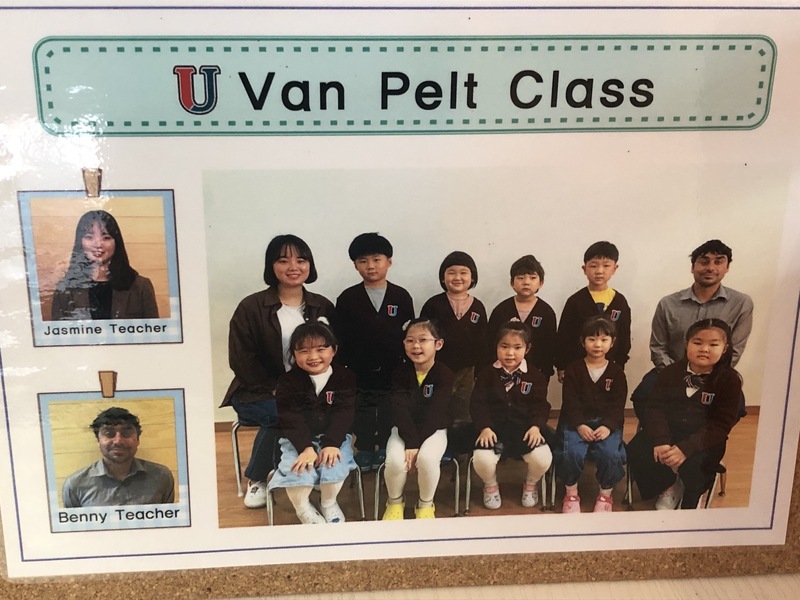 2022-03
2022-03Teaching in Korea
During the height of the pandemic I began to think deeply about what i wanted to do if things ever got "Back to normal." I'd spent my entire life in San Jose California, and decided I wanted to get out and do something different. In early 2021 I went through the process of becoming certified to teach English abroad. I was eventually hired by an English academy in South Korea for a one year contract in the fall of 2021. I enjoyed it so much I ended up re-upping for another year. When I arrived I had to quarantine for one week, and my school director (essentially a principal) picked me up from my quarantine facility and brought me to my apartment, paid for by the school as part of my contract. It was an exciting adventure for me slowly adapting to a new culture and learning to navigate the country of South Korea. The attitude towards COVID was much more serious than in the U.S. The outdoor mask mandate was in force until Spring of 2022, and the indoor mandate was not lifted until January of 2023. Even coming from California, one of the U.S. states with stricter restrictions, it was an adjustment. It certainly wasn't a political issue here in South Korea. I can only speak very rudimentary Korean, but from what I could tell, nobody seemed to have a problem following government health advice. It was illuminating to see how different countries citizens can have radically different views to a crisis based on culture, beliefs, values and attitudes towards Science. Many people still choose to wear masks in public places now in the Summer of 2023. Given the tensions with the North, there is a heavy U.S. military presence in South Korea, which made it easier to connect with other English speakers and get a taste of home near the military bases. I even met my lovely partner here, a space force member stationed in the same city I teach and live in. Being shut in is what drove me to get out of my comfort zone and I'm truly glad for my experience over the past two years in Korea. I've met friends from different countries, experienced aspects of Korean culture that I love, and also have had my privilege checked by aspects of living in Korea that I'm not as fond of. I am excited to go back home this fall, but I hope to carry all I've learned about culture and life in Korea with me. In a strange way, I'm glad that at least the pandemic made me think about what I wanted to do and see once I had the freedom to explore, and I can't say enough how grateful I am for the travel I've been able to do. -
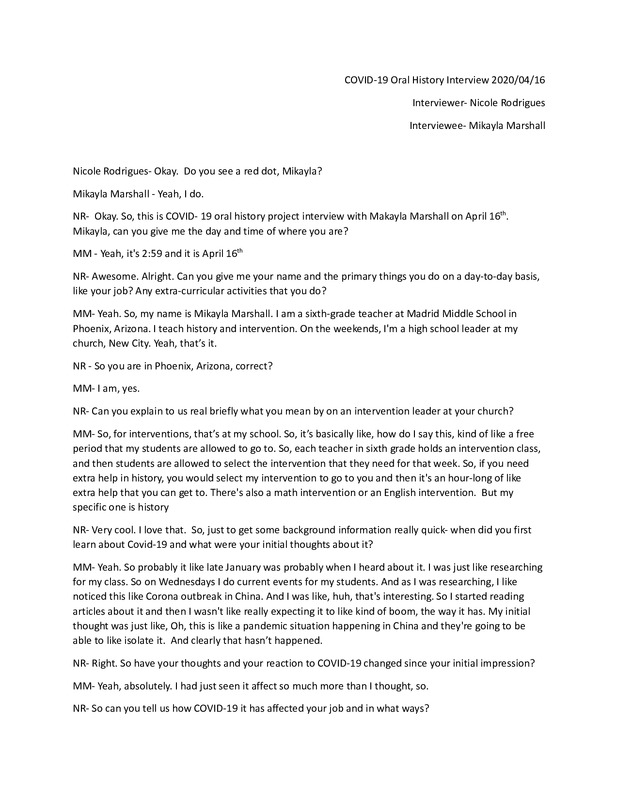 04/16/2020
04/16/2020Mikayla Marshall Oral History, 2020/04/16
-
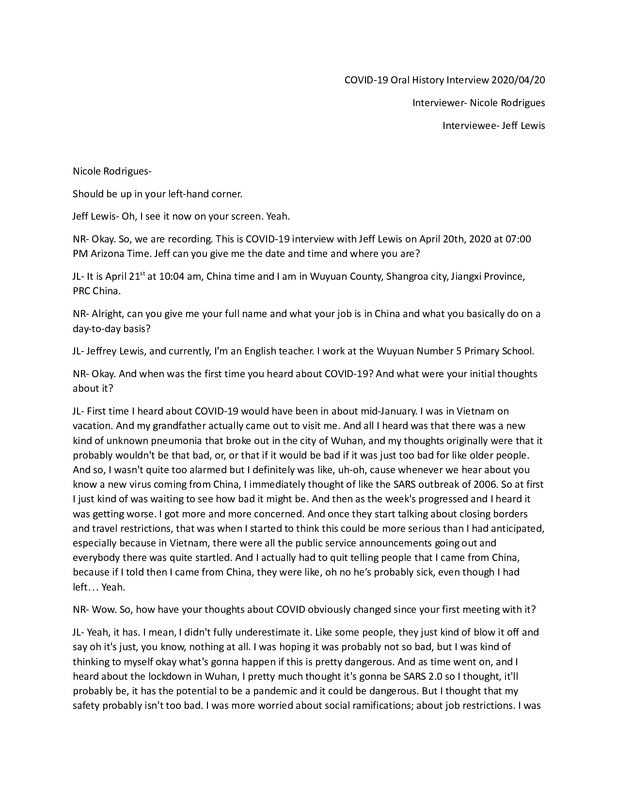 04/20/2020
04/20/2020Jeff Lewis Oral History, 2020/04/20
-
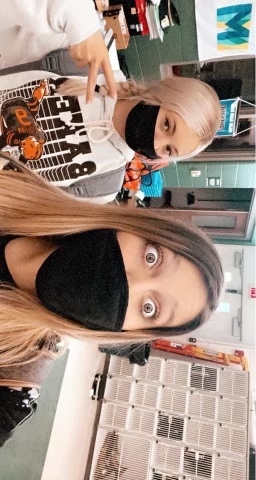 2021-09-30
2021-09-30Masking through the pandemic
I have submitted this picture to show what it was like just to be at school during the pandemic. This is a picture of my friend and I in band class. We had to wear masks, and even had special musician masks we had to wear while playing our instruments. This was a very hard time, especially with it being my senior year of high school. I just wanted things to be normal again. -
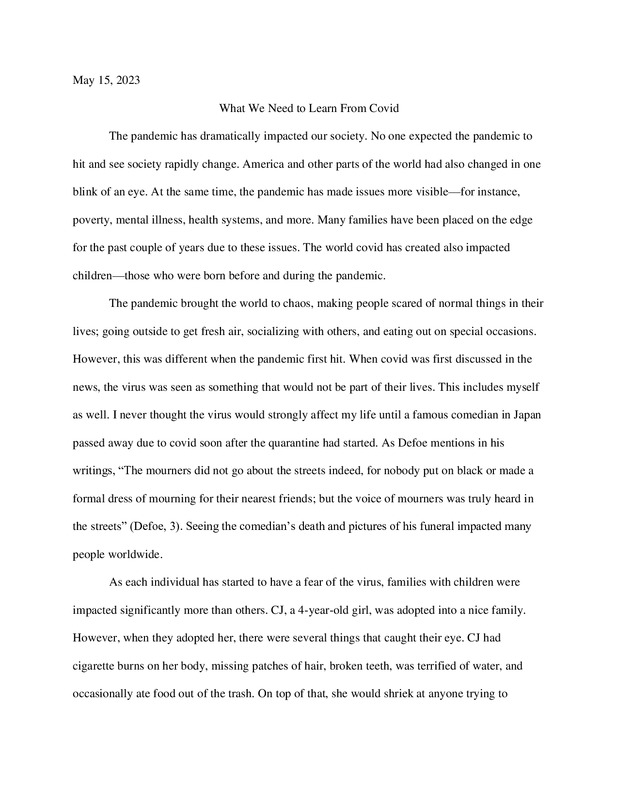 2023-05-15
2023-05-15What we need to learn from Covid
This is based off of what I have seen and heard throughout the pandemic. I have decided to post this because we need more awareness of the issues in education. -
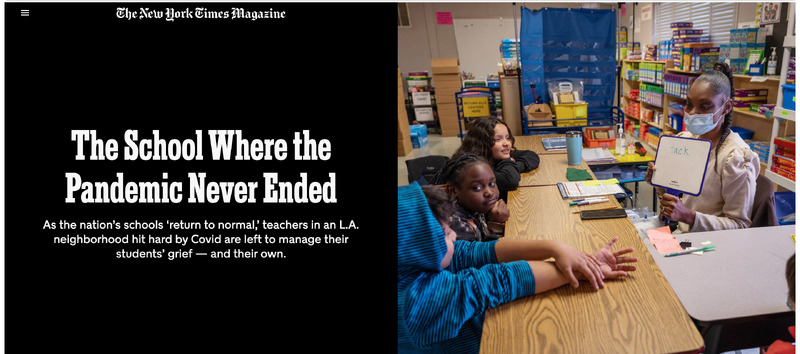 2023-05-15
2023-05-15Analysis of "The School Where the Pandemic Never Ended"
Analyzing a New York Times article entitled, "The School Where the Pandemic Never Ended" through the lens of Daniel Defoe and Thomas Paine -
2020-03-14
My Sedentary Lifestyle Prepared me for What Came
In the year of the pandemic I was not aware of everything that was occurring all around me, I did not watch the news; however, I did get news updates on my phone and people would tell me what was going on. I was working as a personal attendant at an elementary school when covid began, and I did not feel the effects that covid 19 has been changing society, the community that I lived in, and in my life until the lockdown began where everyone had to stay inside their houses. Before the lockdown began I was living a sedentary lifestyle where I would spend the whole day inside the house on my phone or watching TV, so staying in my house was an everyday thing for me and many of my family members and friends did not live near me, so I would always call them; however, I have heard about a couple of family members who I have grown up with mention to me that they had covid and before I returned to work after the lockdown was over my mother tested positive for covid, so this is when covid 19 was hitting hard to me because many people that I was close to were getting sick, when my mother was sick I began to worry whether I had covid 19, because I fell ill before her, however, I tested negative for covid 19 which I admit was a huge relief for me, but I was worried about my mothers well being, until she felt better. In news updates I heard about a lot of people who lost their jobs, and places that were shut down, because of the pandemic, so I felt fortunate to still have employment at the elementary school even if my hours were shorter than before because of the changed school hours, but I still felt fortunate that I still had employment and that none of my friends or family lost their lives to covid 19. When I first heard about the lockdown it was when I realized how truly serious the situation was, many people had trouble staying inside their houses during the lockdown; however, I always stayed inside on my phone, playing video games, and watching TV so remaining in my house was never such an issue for me since this was part of my everyday life so my sedentary lifestyle is what prepared me and got me through the lockdown during covid 19. -
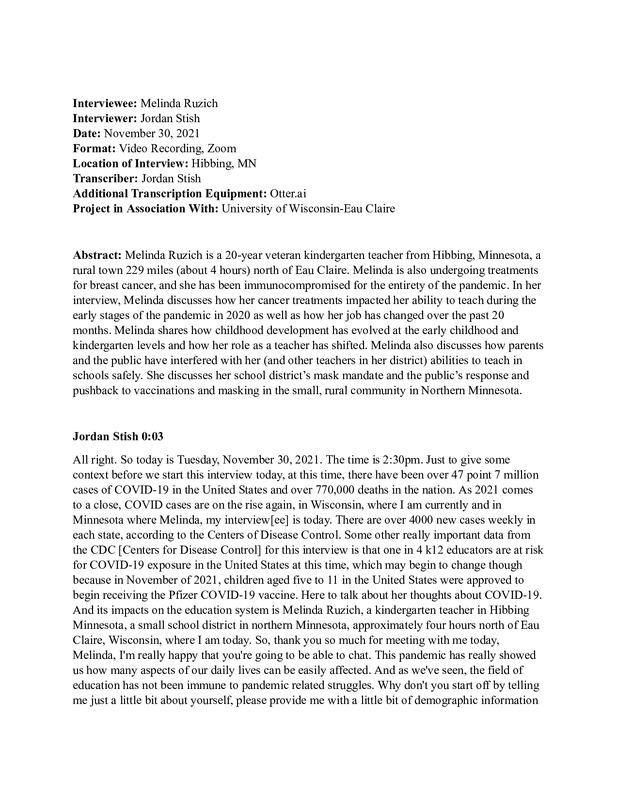 11/30/2021
11/30/2021Melinda Ruzich Oral History, 2021/11/30
Melinda Ruzich is a 20-year veteran kindergarten teacher from Hibbing, Minnesota, a rural town 229 miles (about 4 hours) north of Eau Claire. Melinda is also undergoing treatments for breast cancer, and she has been immunocompromised for the entirety of the pandemic. In her interview, Melinda discusses how her cancer treatments impacted her ability to teach during the early stages of the pandemic in 2020 as well as how her job has changed over the past 20 months. Melinda shares how childhood development has evolved at the early childhood and kindergarten levels and how her role as a teacher has shifted. Melinda also discusses how parents and the public have interfered with her (and other teachers in her district) abilities to teach in schools safely. She discusses her school district’s mask mandate and the public’s response and pushback to vaccinations and masking in the small, rural community in Northern Minnesota. -
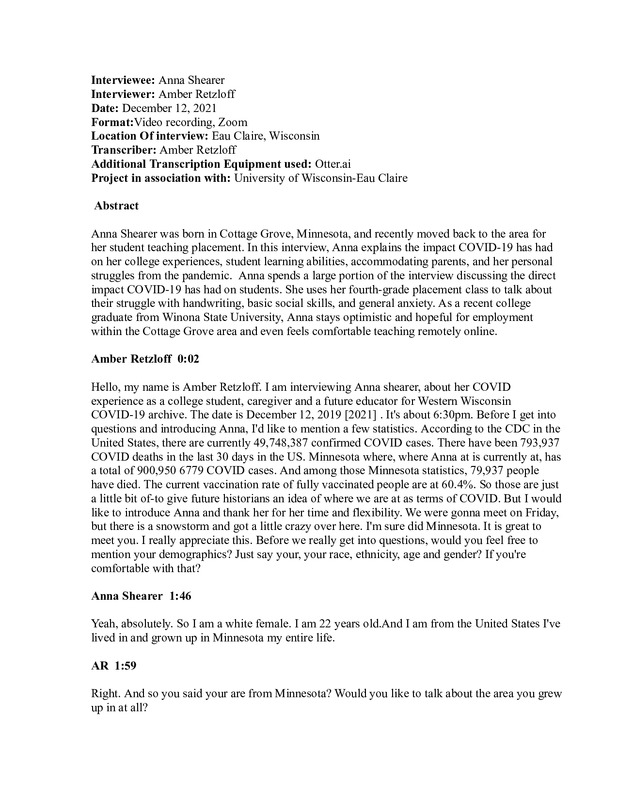 12/12/2021
12/12/2021Anna Shearer Oral History, 2021/12/12
Anna Shearer was born in Cottage Grove, Minnesota, and recently moved back to the area for her student teaching placement. In this interview, Anna explains the impact COVID-19 has had on her college experiences, student learning abilities, accommodating parents, and her personal struggles from the pandemic. Anna spends a large portion of the interview discussing the direct impact COVID-19 has had on students. She uses her fourth-grade placement class to talk about their struggle with handwriting, basic social skills, and general anxiety. As a recent college graduate from Winona State University, Anna stays optimistic and hopeful for employment within the Cottage Grove area and even feels comfortable teaching remotely online. -
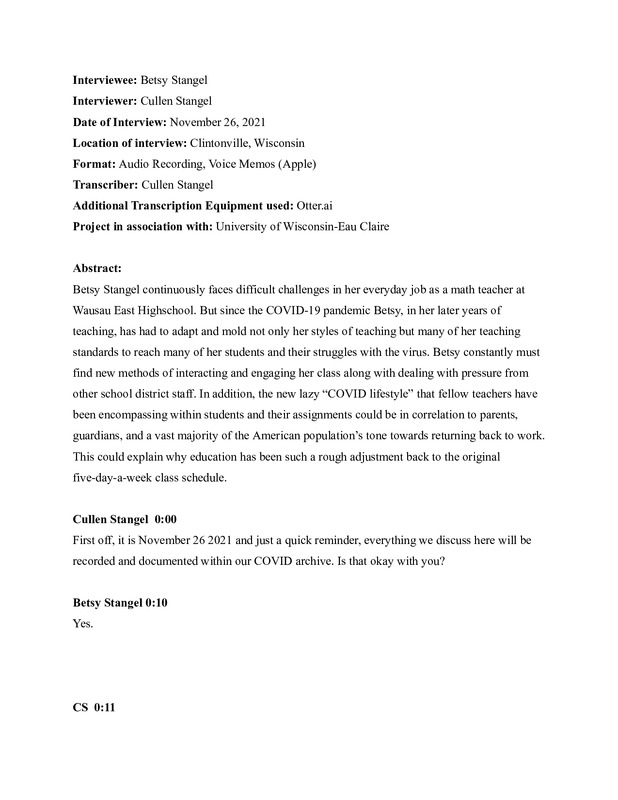 11/26/2021
11/26/2021Betsy Stangel Oral History, 2021/11/26
Betsy Stangel continuously faces difficult challenges in her everyday job as a math teacher at Wausau East Highschool. But since the COVID-19 pandemic Betsy, in her later years of teaching, has had to adapt and mold not only her styles of teaching but many of her teaching standards to reach many of her students and their struggles with the virus. Betsy constantly must find new methods of interacting and engaging her class along with dealing with pressure from other school district staff. In addition, the new lazy “COVID lifestyle” that fellow teachers have been encompassing within students and their assignments could be in correlation to parents, guardians, and a vast majority of the American population’s tone towards returning back to work. This could explain why education has been such a rough adjustment back to the original five-day-a-week class schedule. -
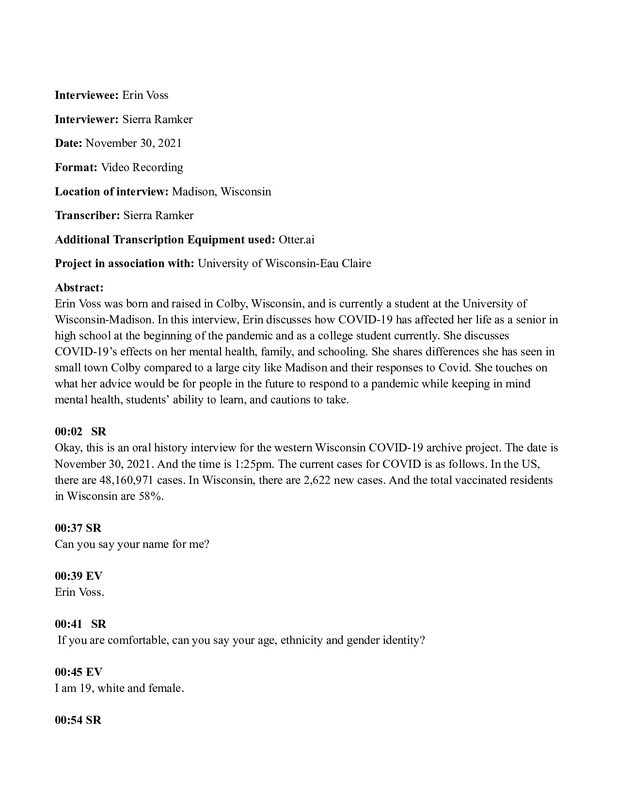 11/30/2021
11/30/2021Erin Voss Oral History, 2021/11/30
Erin Voss was born and raised in Colby, Wisconsin, and is currently a student at the University of Wisconsin-Madison. In this interview, Erin discusses how COVID-19 has affected her life as a senior in high school at the beginning of the pandemic and as a college student currently. She discusses COVID-19’s effects on her mental health, family, and schooling. She shares differences she has seen in small town Colby compared to a large city like Madison and their responses to Covid. She touches on what her advice would be for people in the future to respond to a pandemic while keeping in mind mental health, students’ ability to learn, and cautions to take. -
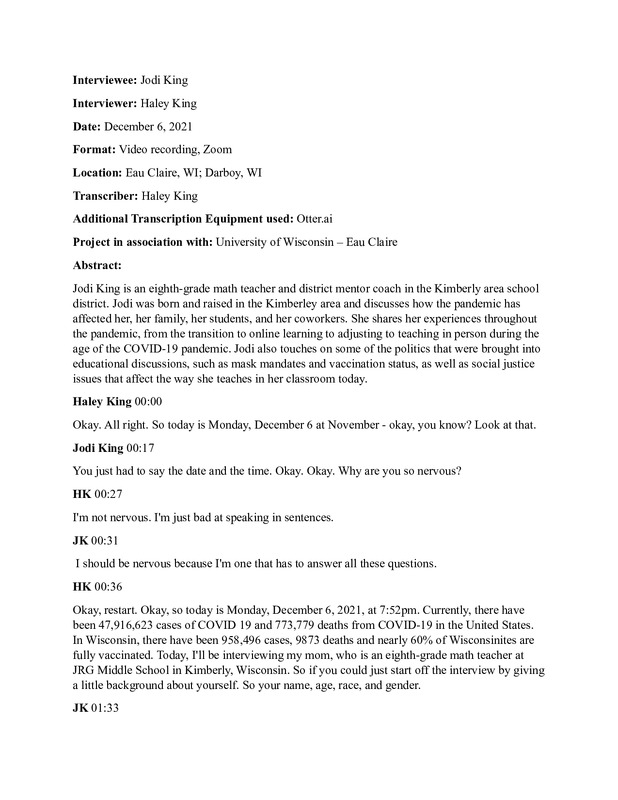 12/06/2021
12/06/2021Jodi King Oral History, 2021/12/06
Jodi King is an eighth-grade math teacher and district mentor coach in the Kimberly area school district. Jodi was born and raised in the Kimberly area and discusses how the pandemic has affected her, her family, her students, and her coworkers. She shares her experiences throughout the pandemic, from the transition to online learning to adjusting to teaching in person during the age of the COVID-19 pandemic. Jodi also touches on some of the politics that were brought into educational discussions, such as mask mandates and vaccination status, as well as social justice issues that affect the way she teaches in her classroom today. -
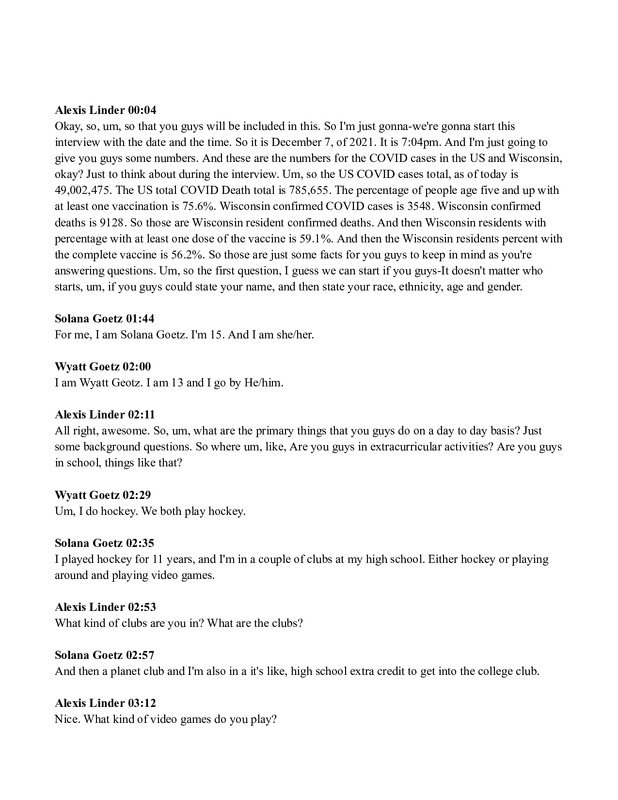 12/07/2021
12/07/2021Wyatt Goetz and Sloana Goetz Oral History, 2021/12/07
-
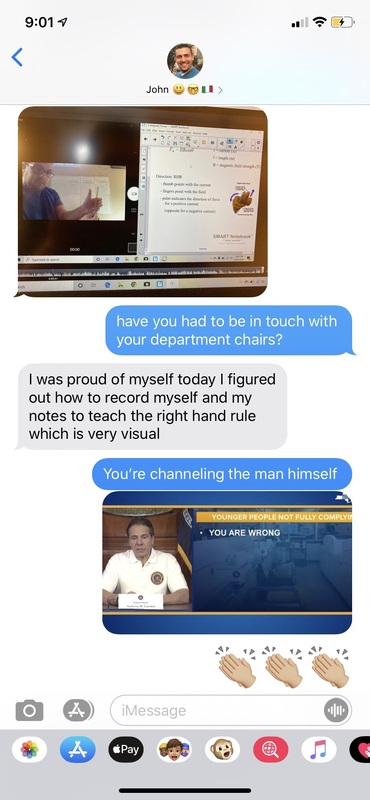 2020-03-25
2020-03-25Teaching in the "New Normal"
My friend John is a high school math and physics teacher on Staten Island. On March 25, 2020 he sent me photo of his laptop screen. Schools had been closed for about ten days and he, like many other teachers across the state, had to improvise how to continue educating in this radically new reality. He wrote, “Proud of myself today. I figured out how to record myself and my notes.” I compared it to the setup of Governor Cuomo’s daily press conferences which were a unifying and relied-upon source of information in those early days of the pandemic. When I asked him to reflect on that lesson he said: “That early in the pandemic I was lucky I was good with tech so I immediately started recording lessons for students to watch asynchronously. In my mind it was the best way to keep continuity. (I would bet at that time I thought we would be back in school before the end of the year). That lesson in particular is very visual (the right hand rule) so I wanted to figure out how to have notes on the screen and myself to be able to show how to use the right hand rule. I tried to do as closely, as I could, what I would have done in class. I tried to have the students continue hearing from me. The videos were posted so students could learn asynchronously. I did host some live sessions where they could ask questions on anything they learned. We could not mandate synchronous learning because families could have multiple students sharing a computer or even parents who now needed to work remotely, etc. That policy changed in Sept. 2020 when we gave out laptops so we could say you have your own meet at your normal class time.” -
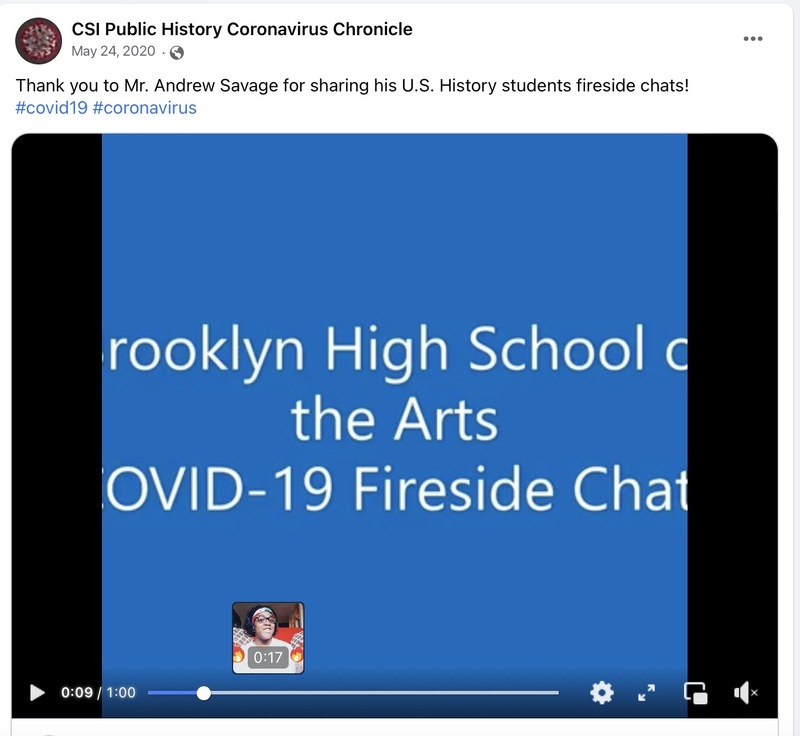 2020-05-12
2020-05-12The Fireside Video Chat
Brooklyn high School of the Arts: "Our students are the best storytellers! Tune in this week to see "COVID-19 Fireside Chats". Stories from quarantine from Mr. Savage's US History class! Tonight, First Period! See the full video in the link below. You won't regret it!" -
2020-03-15
Life during COVID 19
My experience living during COVID 19 was unforeseen. It was my senior year of high school during the year of 2020 when I first heard of the term "Coronavirus." Being a student athlete at this stage of my life, I was looking forward to several upcoming events, such as Prom, my last outdoor track and field season competing as a distance runner, and graduation. When March 2020 arrived, everything came to an abrupt change for the worse. I suddenly found out that all of the current classes I was taking was forced to be online. The outdoor track and field season I was training for with my teammates and all of the goals that I set for myself were abandoned. The graduation I was looking forward to was held on a pre recorded video instead of a traditional in person setting. What I have learned from the pandemic is that some things will not go as planned, no matter how much time and devotion goes into a particular event. Telling this story is important to me because it can let other future generations acknowledge what happened during these uncertain times and what things can be prevented from happening later on. -
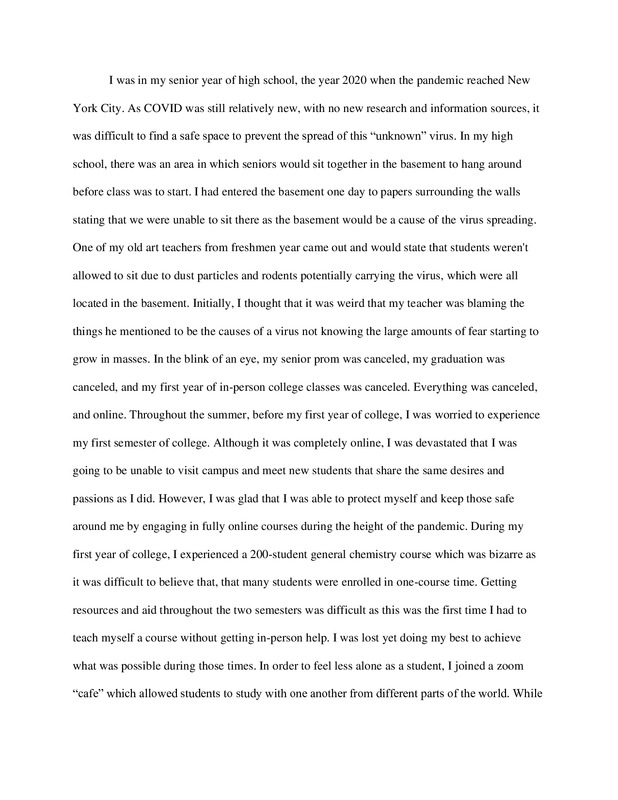 2020-08-05
2020-08-05Only Student on Campus: My First and Second Year at College
The item that I am submitting describes my life as a student throughout my senior year of high school toward my first year of college. I emphasized the feeling of being alone and dealing with the college on a fully virtual level. As months passed it was important to validate the experience and the growth from being in an online setting to an in-person setting. -
2020-03-06
The Two Week Break
My Junior year at Midwood High School took an expected turn as a national emergency was declared on March 13, 2020. I remember watching the news with my mother, excited to see I would have two weeks off from school. My mother and I would both be home as all non-essential businesses moved to remote or closed down indefinitely. I immediately messaged my friends about the two week break, planning to play video games all day long. We spent those two weeks staying up late as if it was an extended spring break. Little did I know that those two weeks would turn into months of isolation, living in fear of going into the outside world. I feared for my father as he was a registered nurse at Woodhull Hospital. Not only did he have to go outside everyday for work, but he would be face to face with patients, many sick and dying from this new virus that took the world by surprise. There was no vaccine for almost an entire year, so all he could rely on were masks, gloves, face shields and hair nets. My father and many other medical workers were needed overtime to deal with the immense amount of patients coming in everyday. As he came home from work my mother would bring his clothes and leave them by our front door. I worried for him at work as I feared he could get this virus that we were still learning about. Thankfully he never got sick with Covid-19 during the early pandemic, and with the new vaccines in development many of our fears were put to rest. After almost two months of not having any classes we were introduced to remote learning through zoom and google classroom. It was a very new experience for my fellow classmates and I, but it was nice not having to leave your bed to go to class for a while. However that relief of not waking up early to go to class turned into yearning to go to school and seeing my friends. Waking up every morning to see a screen filled with blank profile pictures with names made me feel very lonesome. I would never imagine missing going to school, but it was something that I had taken for granted. In my senior year of high school there was the option for hybrid learning which I was very excited about, but I'd later find out that there would only be rows of desks set up in my school gyms we used for physical education. It wouldn't be the everyday schedule of switching classes and seeing my friends in the hallways and library. I ended up doing another year of remote learning which was very draining but I managed to do well in all my classes with nothing else to do. Unfortunately I did not have a prom or senior trip, but I was very lucky to have an in person graduation and see all of the people I once saw everyday again. This story of the pandemic is very significant to me as it taught me to never take things for granted as everything can change in a moments notice. The things I'd known as my everyday routine of school and hanging out became a distant memory for a long time until numbers and fears of the virus fell. Being able to go to campus now and have a regular life again is something I will now cherish forever. It is still somewhat hard to socialize again after being isolated for so long, but I have made some friends along the way and I look forward to all the memories that await me in the future. -
2020-03-13
In the Blink of An Eye
Maybe if quarantine lasts three weeks, we’ll have spring break before we go back to class, I wistfully think to myself. It’s already March 13th of 2020, but the air is still nippy and my mom still makes me wear that atrocious parka. She’s been hearing all these reports about the coronavirus, and I think it’s releasing her inner germaphobe. My school day finishes off like any other, except I have to stay behind for AP Biology review, like who has review two months before an exam? Following an hour full of practice problems, workbooks, and texting my friends under my desk, it’s finally time to go home. The talk of the school is if Xaverian plans on closing for quarantine, following the footsteps of nearly every other Catholic school in the city. But I don’t even take two steps out of my desk before my iPad pings with an email. One by one, we all find out that Xaverian will be closed for the foreseeable future, and that online learning will commence on Monday. I picture using this new interface, Zoom, for class. A feeling of exhilaration grows in my chest. I can already picture it: no uniforms, and no restrictions—just a newfound capacity for freedom. Our group parades towards the lockers, gossiping while packing up our books and putting on our coats. The moment doesn’t feel real; it feels like I’m floating, suspended in the joyful innocence of being a high school senior. With our navy and khaki skirts swishing around our legs, knees exposed to the frigid air, my three friends and I begin the trek home through Bay Ridge, blissfully ignorant to the fact that it would be the very last time we ever put those uniforms back on, or that it would be three months before we saw each other next. How naïve we were walking home that day, discussing how fun and convenient online learning would be. We chat about prom dress shopping, boys, and how funny it would be to take AP exams online—not realizing that prom would be canceled, and that we would take those exams online. It was my last day of normal, the last day before everything changed for good. Three months later, I graduated high school from my porch, wistfully smiling as I was handed a trophy for becoming the Salutatorian of Xaverian High School’s Class of 2020. The following week in June, I stand on those same steps in funeral clothes, wondering how everything changed in the blink of an eye. Not even seven days after graduation, my grandma passes away alone at Staten Island University Hospital, unable to be accompanied by her family because of COVID-19. It comes out of the blue; she feels fatigued and lethargic, but refuses to get medical attention until the very last moment because of possible exposure to the virus. By the time she arrives at the hospital, they admit her in stable condition, but she never makes it through the night. As of June 20th, 2020, 176,066 Americans are dead from the coronavirus. My grandma didn’t have it, but I can’t help counting her as the 176,067th life taken away by this disease. Because of COVID-19, she skipped her doctor’s appointments, and lived in complete isolation to avoid contracting the virus. Yet in the end, it is the virus that indirectly takes her away, preventing any of her loved ones from being present in her final moments. Nearly three years later since that last day of high school, on February 21st, 2023, I can reflect on how much my life has changed. COVID-19 went on to rob me of my first two years at Brooklyn College–I spent them cooped up in my bedroom on Zoom, not meeting my newfound friends until my junior year of college. COVID-19 influenced me in my choice to be a Health and Nutrition Science major, as I hope to learn more about preventing disease and use my knowledge to make me a better physician in the future. Millions have now died from COVID-19, and my version of “normal” has forever changed. Three years ago, the future seemed bleak and dire. I still wear a mask on the train, but now I see hope in the future because of our vaccine development and how normalized it’s become to talk about public health. I can only hope that as time goes on, humanity works together to regain a sense of normalcy. -
2020-12
Hawaii - December 2020
In March of 2020 my family and I were supposed to go to Hawaii for our spring break. When I was at work around St. Patrick's day, the school administration announced that all sports were postponed because of covid-19. A couple of days later I found out that we would be moving to virtual learning until spring break. During this time I remained hopeful that we would be back in the classroom after the break and that I would still be able to visit Hawaii. As the weeks went on it became clear that this was not the case. Eventually we moved to permanent virtual learning and the airlines canceled and refunded my ticket for Hawaii. As 2020 continued on I became more and more frustrated over the impact of covid, especially as what seemed like 3 weeks at home, turned in to several months without travel and in person interaction. In December of 2020, after completing a semester of half virtual, half in person learning I was in need of a break and a change of scenery. On Christmas my family and I found really cheap flights to Hawaii, however these flights were leaving the next day. Since I was a teacher on Christmas Break I had the time off, the only issue was that we needed to get a negative covid test before landing in Maui. We quickly booked the flights and scrambled to find a place we could get a covid test. In order to get off of the plane in Hawaii we needed to take a covid test 12 hours before arrival and our results needed to be negative. We did not have enough time before our flight to have a test shipped to our house nor did we have enough time to wait 2-3 days for results. Luckily we found a place 45 minutes from where we lived that had an opening for four rapid tests. After acquiring our test, 18 hours before our flight we eagerly awaited the results. All four of us had a negative test and we were able to board our flight to Hawaii. When we landed in Hawaii, in order to get off of the plane we had to show our negative test results. If someone did not have test results they had to remain on the plane and wait for it to return to the mainland. After showing our tests, we had our temperatures taken again and and our visit, including our accommodations, had to registered. The remainder of our trip to Hawaii was relaxing. Although it was weird to walk on the beach with a mask and sit far away from other guests, it was nice to get away. While we were in Hawaii I remember talking to a waitress we had that explained that from March to July residents were not allowed to enjoy the beaches. She described how lonely and isolated she felt stuck in her small apartment by herself. Even though it was difficult to get to Hawaii during covid, we needed a getaway and the hospitality workers in Hawaii were glad to see things slowly picking up again. -
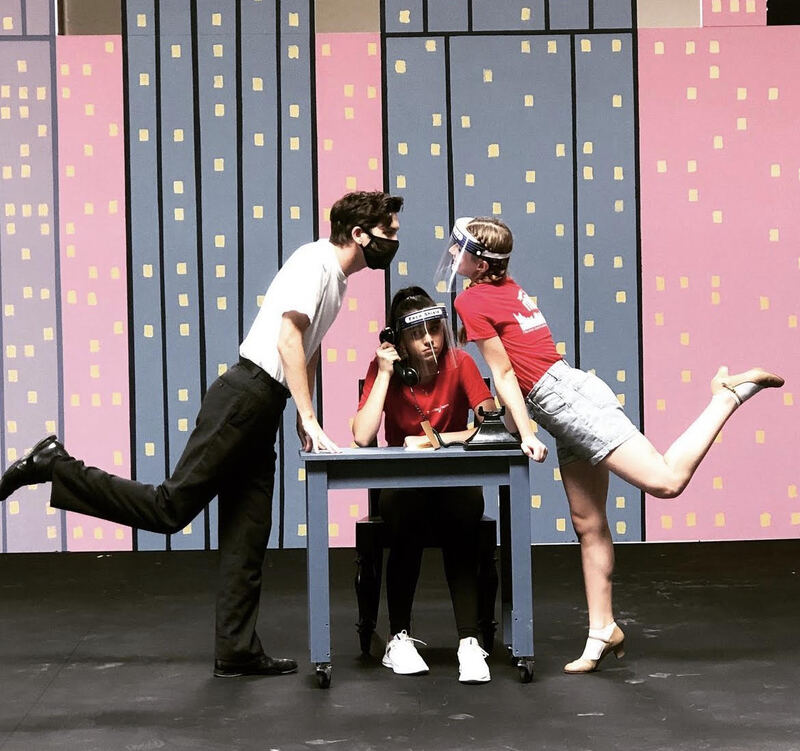 2020-07-06
2020-07-06Mask or shield, Ms. Rachael?
I have been a theatre educator for almost 10 years, in particular, children's theatre. I have seen, experienced, and done all that there can be done in a field such as this. Before the official lockdown, we were in the middle of rehearsing 5 different productions. Then, the world shut down and everything stopped. Once it was finally deemed "safe" to be back around one another, rehearsals started again and picked up where we left off. The kids were now older, they had memorized this script forward and back while being stuck at home, and they were eager to get back to work and finish their show. We social distanced, always fever checked, washed hands around the clock, and packed every safety measure we could. Before they begun to sing, they asked me which would be okay to use - the mask or their shield. I took this photo at the end of their dance, when the boundaries of social distancing did not apply. I remember when they leaned in to one another, hovering over someone else, I audibly gasped because I had not seen them that close together in so long. This photo will always remind me of how nervous I was to transition back to post lockdown. -
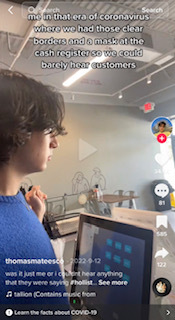 2021-12
2021-12Plastic Dividers
The plastic dividers were and are an integral part of COVID. My high school's cafeteria had them and it made it hard to hear my friends when we were conversing. Like this TikTok post I saw awhile ago, it reminded me of how it separated me from the customers at my job around a year ago. The dividers were made to keep people safer from COVID-19 even when at a close distance from each other. However, one time when I was at work, the sliding doors to the entrance were open, and it was so windy outside one day that the wind blew the plastic divider onto my back when I was turned around bagging an item for a customer. I have a personal grudge against those things now. -
2020-03-06
March of 2020
March of 2020 is one of the most memorable dates in my life. I was a junior in high school, and news of COVID-19 spreading throughout the United States was increasingly growing. I remember being on a bus with people who went to my high school after our school's girls basketball team played a game a couple hours away from where our school was. Our team lost in a close regional finals game, so the ride back home was somewhat gloomy. I remember people behind me talking about this new virus, now COVID-19, and I heard them say, "I hope it doesn't come to Ohio." This moment is engrained in my mind because just a couple weeks later, the whole world went into lockdown, and I missed out on the rest of my junior year of high school. It is somewhat weird to think about how back in the earlier days of the pandemic, everyone was confused and worried about what COVID-19 was, and now, it is just a normal aspect of our lives today. -
2020-05
Pandemic In Ohio
During the pandemic it was certainly a struggle for all of us. In my rather large town called Hilliard, many didn't take the pandemic seriously. People straight up just did not care about what was going on, and were even convinced it wasn't real. Even students were denying to wear masks in school. When in came to the point of complete isolation people were surprised, as if they didn't see it possibly happening. I want people to know that this is pandemic is 100% real and it cannot be taken lightly. -
 2020-08-11
2020-08-11Virtual Learning in California
The American response to the global COVID-19 Pandemic was multi-faceted. However, of specific importance to the nation were the changes made to public education. As the Pandemic resulted in the closure of businesses, teachers and students were required to continue their educational programs online from the privacy of their homes. Although the effects of distance learning will continue to be seen, virtual learning severely limited the ability of students and teachers to use sensory perception as a tool for learning and instruction. First, distance learning no longer enabled American teachers to utilize the sensory perception of “proximity.” Throughout public education “proximity” is used to encourage student engagement with both instruction and content. Many teachers will walk their classrooms during student activities and use sensory perception to sensorially inform students that they are near to them and are assessing their engagement. Teachers use this strategy as a reinforcement tool to develop students’ ability to stay on task. Yet, during the COVID-19 Pandemic, social distancing policies made “proximity” not only impossible, but also illegal, limiting to what extent teachers could use sensory perception to foster engagement and learning. Second, not only were educators no longer allowed to use the sensory perception tool of physical proximity, but also many educators were forced to rely solely on the sensory perception of sound. School districts throughout the state of California, for example, did not permit educators to require their students to verify their attendance in live video format. The result was educators and students were engaging predominantly through speaking and listening. Furthermore, being denied the sensory perception of sight, educators could not assess to what extent students were engaging with instruction and activities. In conclusion, the COVID-19 Pandemic enacted emergency response strategies which directly affected the education of Generation Z. For both students and educators, sensory perception became more limited for every student. Yet, the sciences, including social science, are built upon the empirical information a human being receives through them. Perhaps this video will serve as evidence to answer the question, “To what extent were students denied the right to sensory information and science?” -
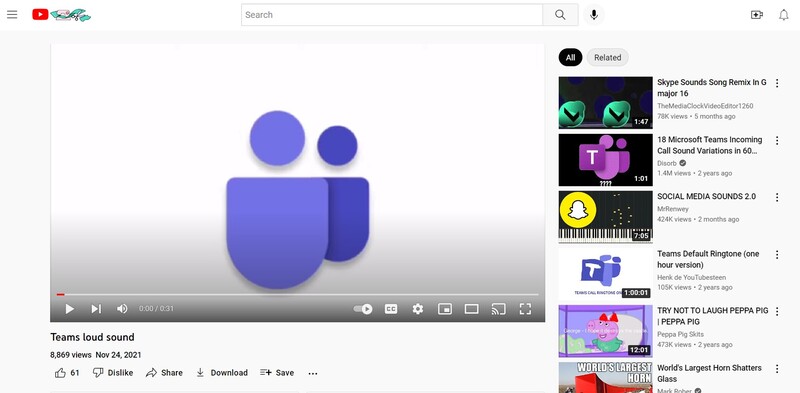 2020-03-21
2020-03-21Education changed
It was my first year teaching middle school history. I was bright-eyed, excited, and felt like I had finally found my calling in life. I went into spring break with such an excited feeling about my new career path. Coming from retail, I could finally have time to spend with my family and not have to worry about making a quota. Then the email came. We would be moving to distance learning and I would not get the chance to finish my first year as an educator with my first group of kids. The sound I most remember was the Google Meets login when someone joined. That sound will forever be associated with the pandemic. The sound I had never heard before became the sound that brought me joy as I was finally able to make sure my students were okay. I remember that sound and immediately checking to see who was logging in. It brought mixed feelings of compassion, empathy, and sadness. Even as we started to get back into the classroom, nothing would ever be the same as it once was. But that sound, that one quick sound, brought on the emotions of this educator. And I hope I will never have to hear that sound again. -
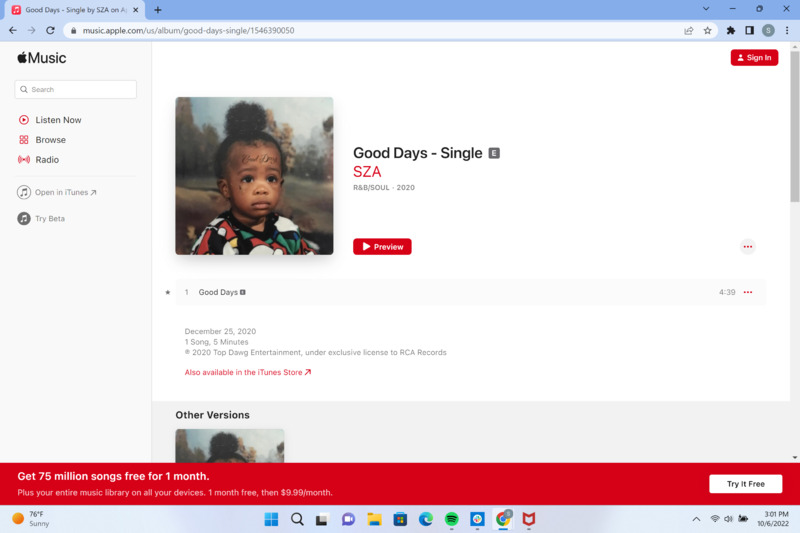 2021-02
2021-02Hoping for Good Days
It was several months since my last day in a classroom. March 13, 2020 to be exact. Friday the 13th. The previous school year we were told it was to be a possible 2 week break that ended up going until the end of the year. What was to become of the next school year of 2020-21? I tried to stay optimistic over the summer and enjoy the time spent with family. We were lucky to have each other and have a yard and house where we felt safe to be quarantined. I knew a lot of my students were not so lucky in that they lived in apartments with several family members. Still I wanted to be optimistic about the upcoming year. As the start of school year date got closer, it was apparent we were to continue online teaching via zoom. I felt I was pretty tech savvy and could integrate technology enough to keep my students engaged, but it was still challenging. I taught incoming freshman 9th grade students. They did not get the “new students” experience of coming to my school and meeting and greeting all the faculty and each other. Initially the expectation was to have all students have cameras on, and for the most part in that Fall semester, my students did. But then towards the break students started getting sick, parents were losing their jobs, some even lost family members. People were sad. We barely made it into the winter break with students attending “online”. I was fortunate to have most of my students log in but in other classes students stopped showing up. And if they did log in, cameras were off and it felt like talking to a void. Were they still paying attention? Were some of them just logging in and doing other things like playing video games or sleeping? I was frustrated, but also empathetic knowing for a lot of these students survival, not academics, was their priority during the time. After the winter break and a return to zoom teaching, it was a palpable sadness. There were people who had lost loved ones, and my students were depressed. I could feel the grief and sorrow through the screen and sometimes I would weep after my classes ended for the day. I had to maintain a persona of optimism for my students online and also keep encouraging their academic pursuits. I have never had such a challenging teaching year like the 2020-21 year. The sensory experience I am recalling is sometime in February of 2021. It was the second semester of school, back from the break and many people had a rough time of the holiday season with loneliness, fear, and loss. I don't know how I came up with the idea but I thought about students sharing playlists with the class. I would review them, and if we had a test together on zoom I would play songs on the background. One particular song I found was “Good Days” by SZA. It was not my style of music, but I knew it was what my students listened to. The day I played that song I started to get a lot of feedback from the zoom chat from all my classes about that song. By this time a majority of students had stopped showing themselves on camera and/or stopped talking, however Good Days sparked something in my students. The intro of the song is very melodic and serene. It is one of those songs that sounds very sweet, but is very sad at the same time. I could tell by the response of my students that it hit a nerve. A few of them began to speak up again in class, a few would turn their camera on again. And of course, I had several sending messages after class thanking me for the song. This happy/sad song connected me again to my students that I thought I had lost over winter break. It gave me a little hope again, and I think it gave some of them hope too. Now, whenever I hear Good Days by Sza it reminds me of those lonely online zoom classes in February and how we were all feeling a bit sad, but a simple song gave us all a bit of hope that the future was to have some Good Days ahead. Lyrics to Good Days All the while, I'll await my armored fate with a smile Still wanna try, still believe in (good days) Good days, always (good days) Always inside (always in my mind, always in my mind, mind) Good day living in my mind -
 2020-03
2020-03Bells Continued to Ring
When the pandemic began, I was finishing up my last few months of student teaching. My mornings included talking to students about their day and weekend plans they had; however, once the pandemic started that changed drastically. The students were gone and the silence began. Highschools are customarily, a loud and busy environment; yet, overnight the students were gone and there was nothing at school but silence. The halls were empty, my classroom was empty, the whole school was empty apart from a small group of staff. For the rest of the year, I would go to school and sit in my classroom alone in almost complete silence. No face to face interaction with students or even other staff. As a teacher, this was taxing on my mental health. From one day to the next my entire occupation had been flipped upside down. I never saw my students again. I still wonder what became of them. The one thing that sticks in my mind from that period is the sound of dismissal bells at school. For some reason the bells continued to ring even though there were no students. Everyday when that first hour bell would ring I would remember that no students were coming. This was a reminder everyday that the world had changed. I recorded the sound of dismissal bells at my highschool. Two years after the pandemic started, this sound still reminds me of teaching during the pandemic. -
2020-08-11
Long-Distance Learning
The American response to the global COVID-19 Pandemic was multi-faceted. However, of specific importance to the nation were the changes made to public education. As the Pandemic resulted in the closure of businesses, teachers and students were required to continue their educational programs online from the privacy of their homes. Although the effects of distance learning will continue to be seen, virtual learning severely limited the ability of students and teachers to use sensory perception as a tool for learning and instruction. First, distance learning no longer enabled American teachers to utilize the sensory perception of “proximity.” Throughout public education “proximity” is used to encourage student engagement with both instruction and content. Many teachers will walk their classrooms during student activities and use sensory perception to sensorially inform students that they are near to them and are assessing their engagement. Teachers use this strategy as a reinforcement tool to develop students’ ability to stay on task. Yet, during the COVID-19 Pandemic, social distancing policies made “proximity” not only impossible, but also illegal, limiting to what extent teachers could use sensory perception to foster engagement and learning. Second, not only were educators no longer allowed to use the sensory perception tool of physical proximity, but also many educators were forced to rely solely on the sensory perception of sound. School districts throughout the state of California, for example, did not permit educators to require their students to verify their attendance in live video format. The result was educators and students were engaging predominantly through speaking and listening. Furthermore, being denied the sensory perception of sight, educators could not assess to what extent students were engaging with instruction and activities. In conclusion, the COVID-19 Pandemic enacted emergency response strategies which directly affected the education of Generation Z. For both students and educators, sensory perception became more limited for every student. Yet, the sciences, including social science, are built upon the empirical information a human being receives through them. Perhaps this video will serve as evidence to answer the question, “Is the right to sensory perception and scientific information included within the natural rights of life, liberty, and property?” -
 2022-07-20
2022-07-20Hermit HERALD, ISSUE 143
Biden/Trump 2024? -
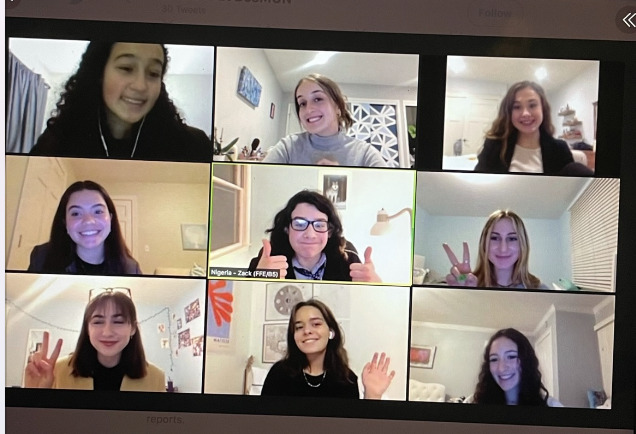 2021-02-06
2021-02-06Model UN in the time of a Pandemic
I uploaded a screenshot of my Model UN conference that had to be conducted over Zoom during the COVID-19 pandemic. In a normal year, a Model UN conference would take place at a large event space, usually a university or a hotel. Model UN teams from high schools across the globe participate in the conferences that my school attends. Unfortunately, I did not get to have this unique experience during the pandemic year. Instead, my school took part in an online form of the conference via zoom and discord, through Boston University. Although it was not the same, I was fortunate to have the opportunity to meet plenty of interesting people from all over the world! This screenshot shows the "bloc" (or alliance) that I had formed with students representing countries such as Mexico, Nigeria, and Russia. I can be seen in the middle box on the right, representing the nation of Afghanistan! -
 2021-03-20
2021-03-20Debating Through the Pandemic
I've been doing Model United Nations since my freshman year. Although it is a club infamous for the insanely intense students it produces, it's also known for its beyond fun 4-day conferences with food, a delegate dance (like a Homecoming), and chaotic debate sessions. However, COVID changed all of that for me, when all MUN conferences started going virtual, including our school's own conference. We started making speeches on Zoom and raising our virtual hands to get called on. We used Breakout Rooms to talk with other delegates and sat at our desks through four long strenuous days of debating. This story represents the dozens of other school clubs and sports teams that were thrown off guard in trying to alter their events to fit these new guidelines of the pandemic. But, to echo a larger sentiment, it represents how kids and their interests were able to adapt. Students still had safe spaces to pursue their interests, even if it was over Zoom. During this time, communities banded together and in some cases, even expanded, allowing classes of COVID-impacted kids to continue building their passions. In my case, I actually learned to love MUN for what it is, rather than be distracted by its bells and whistles. So, while the pandemic brought along its own challenges, it fostered adaptation at its finest, and relationships centered on keeping a sense of normalcy alive, even with something as small as a school club. -
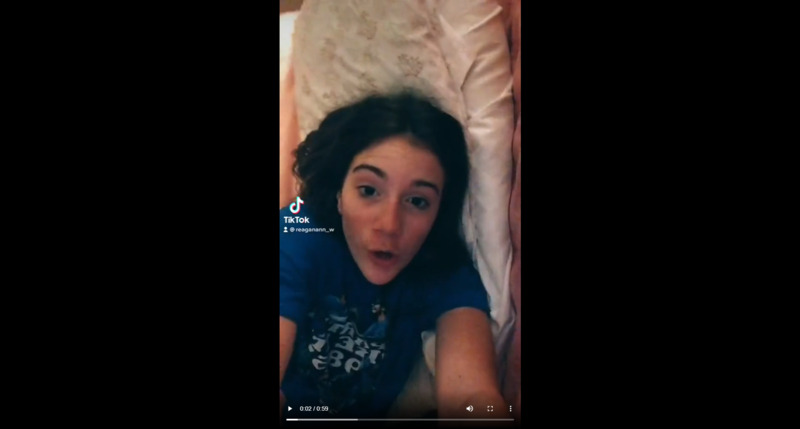 2020-03-12
2020-03-12Little Did We Know
This is a Tik Tok video from my sister’s account of her documenting the day we were sent home from school. In the video, she’s telling her viewers that school has been cancelled for three weeks, due to the rise in COVID-19 cases across the globe. This video says a lot about the pandemic, because personally I felt that the closing of schools and businesses for the sake of quarantine was a really defining moment of the pandemic. There haven’t been many moments/ pandemics in history that have provoked the closing of institutions, so the fact that this happened says a lot about the magnitude of the situation. This personal account also says a lot about the pandemic, because similarly to my sister in the video, at the beginning of COVID-19 many people were scared and unaware of how long this pandemic would ensue. I feel this video captures her reaction very well. -
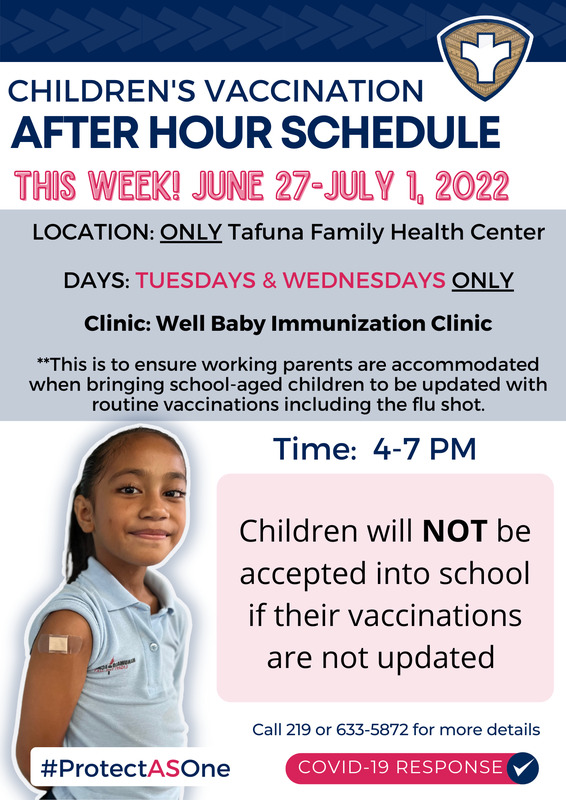 2022-06-27
2022-06-27American Samoa's Children Vaccination
With schools opening back up in American Samoa, children are required to get vaccinated. As the Department of Health points out that children will not be accepted into school if their vaccinations are not updated. The Department of Health has put out this flyer on June 26, 2012, for the public especially working parents to get their children's vaccination after hours from 4-7 pm on June 27 - July 1. -
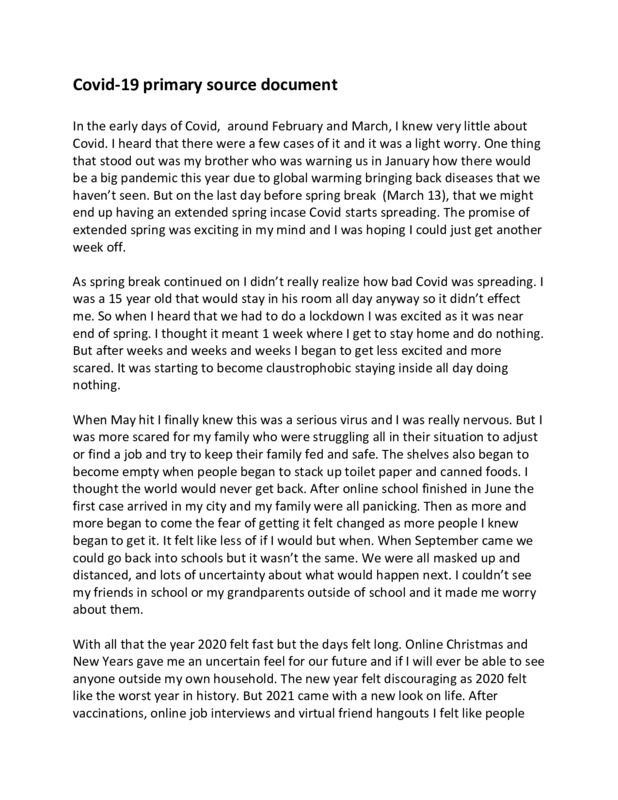 2022-06-16
2022-06-16Teenager Covid experience
Wanted to share how pandemic effected myself and my family -
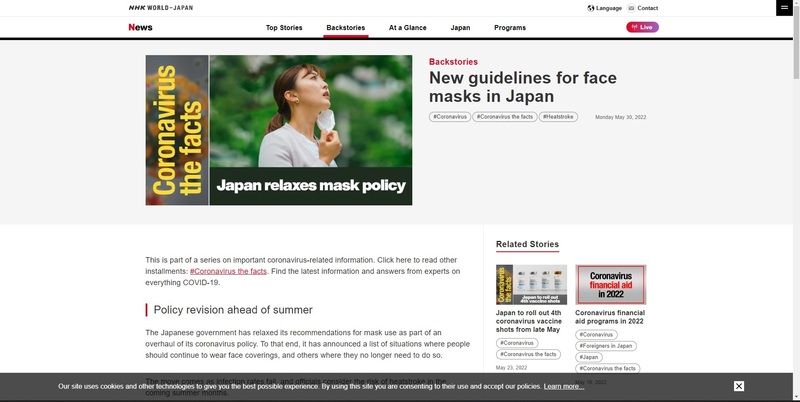 2022-05-30
2022-05-30New guidelines for face masks in Japan
Japan, as of May 30th, 2022, is relaxing the face mask guidelines. For the most part, masks do not need to be worn outdoors except when the elderly are in close quarters to other people. Indoors, masks are still required indoors except in the case of when someone is in little to no conversation, which the article shows in a chart. The chart's example states walking around museums and libraries where there is little to no conversation. One of the reasons for why Japan is relaxing face masks is because summer is approaching and the temperature will rise. There are fears about face masks causing heatstroke. In Japan, temperatures can range from 70-90 degrees F, but the summers are hot and humid too. So, it makes sense to relax the restrictions, especially in the outdoors. -
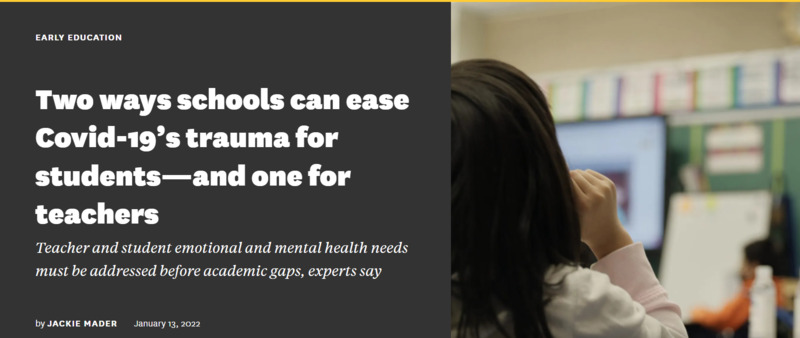 2022-01-13
2022-01-13Addressing Trauma from COVID-19 on Students and Teachers
COVID-19 has had a huge impact on both students and teachers. Not only has there been learning gaps, but there has also been an impact on the social and emotional well-being of teachers and students. Many experts now say that these issues need to be addressed before focusing more on academics. -
 2022-02-01
2022-02-01More than Half of Teachers Looking to Quit Due to COVID
According to a poll given by the National Education Association, 55% of teachers who participated feel burned out enough from COVID-19 to quit. Some of the reasons that COVID-19 has caused additional stress for teachers is due to student behavior, additional responsibilities, and longer hours. -
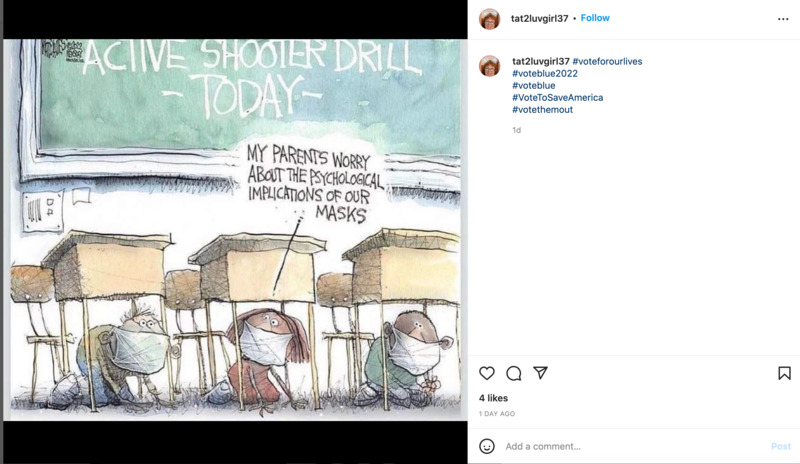 2022-05-28
2022-05-28My parents worry about the psychological implications of our masks
This is an Instagram post by tat2luvgirl37. This is a political comic referencing both school shootings and mask wearing. The comic artist is trying to create irony where the parents of one of the kids seems to worry more about mask wearing rather than gun protection. The mask versus no-mask camp is highly partisan, with the no-maskers typically being Republican in the United States, and the pro-maskers being Democrat. Additionally, the Republican party is overall viewed as being more-pro gun, which some critics say is the reason why mass shootings happen more often. As we can see by the #voteblue used by the person that reposted this comic, it is very politically charged and meant to be criticism against those that are pro-gun and anti-mask.
